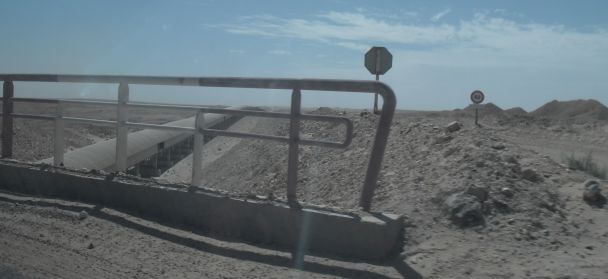
The German company ifm stated on Twitter yesterday that it cannot always know where its products end up being used. We found them in Western Sahara.
Photo. The conveyor belt transporting phosphate rock from the mine to El Aaiun harbour is the longest conveyor belt in the world. Photo @ElliLorz

Western Sahara Resource Watch (WSRW) has found a reference to ifm equipment used in the Bou Craa conveyor belt in a patent claim from 2018 [or download].
The patent claim was submitted by a subsidiary of the Moroccan state owned phosphate company OCP SA. The highly controversial conveyor belt allows Morocco to transport the conflict minerals from its illegal mining operation out to the coast from where they are shipped to clients overseas for fertiliser production.
WSRW referred to the ifm equipment - and to our unanswered letters to the company - in our report P for Plunder that was published last week.
Whereas the letter to the company never received any response, the German company yesterday, 13 April, published three tweets on the matter.
The company states that it has no control over where its client has used the equipment that it has supplied.
”The claim that we are involved in the maintenance of a conveyor belt in Western Sahara is not true. We are not involved in any company that operates a conveyor belt there, nor do we maintain one", the company wrote.
“Of course, in many cases we do not know exactly where our customers use the purchased ifm products. Under no circumstances can a delivery of products be regarded as the operation or maintenance of a machine or system of our customers", another tweet reads.
"In this context, we refer to our company philosophy, which was published in 1990. There it says, among other things: 'ifm will not develop, manufacture or sell any products that are used directly for military or weapons purposes'", a third notes.
The three statements are posted as comments to a tweet from WSRW. As a followup to these statements, WSRW sent another letter to the company yesterday.
The P for Plunder report has received wide coverage internationally, including this week in German daily Taz, and in Austrian daily Der Standard. Ifm was mentioned specifically in the German daily Junge Welt on 8 April.
One year ago, the German company Continental AG ended a long involvement of supplies to the same conveyor belt.
Since you're here....
WSRW’s work is being read and used more than ever. We work totally independently and to a large extent voluntarily. Our work takes time, dedication and diligence. But we do it because we believe it matters – and we hope you do too. We look for more monthly donors to support our work. If you'd like to contribute to our work – 3€, 5€, 8€ monthly… what you can spare – the future of WSRW would be much more secure. You can set up a monthly donation to WSRW quickly here.
WSRW urges shareholders to challenge Continental
Continental’s controversial contract in occupied Western Sahara is two weeks away from expiration. If renewed, WSRW asks owners to raise the matter at upcoming AGM.
What is Continental negotiating with OCP?
As Continental renegotiates its contract with Morocco's national phosphate company, it is still not clear whether the German group intends to limit its operations to Morocco proper or extend them into occupied Western Sahara.
German organisations condemn Continental's conflict conveyor
The multinational company that facilitates the controversial phosphate exports in Western Sahara receives criticism from a group of German organisations.
Continental negotiating contract renewal with OCP
The contract of German engineering company Continental that covers maintenance work on the phosphate conveyor belt in occupied Western Sahara expires in five months.


